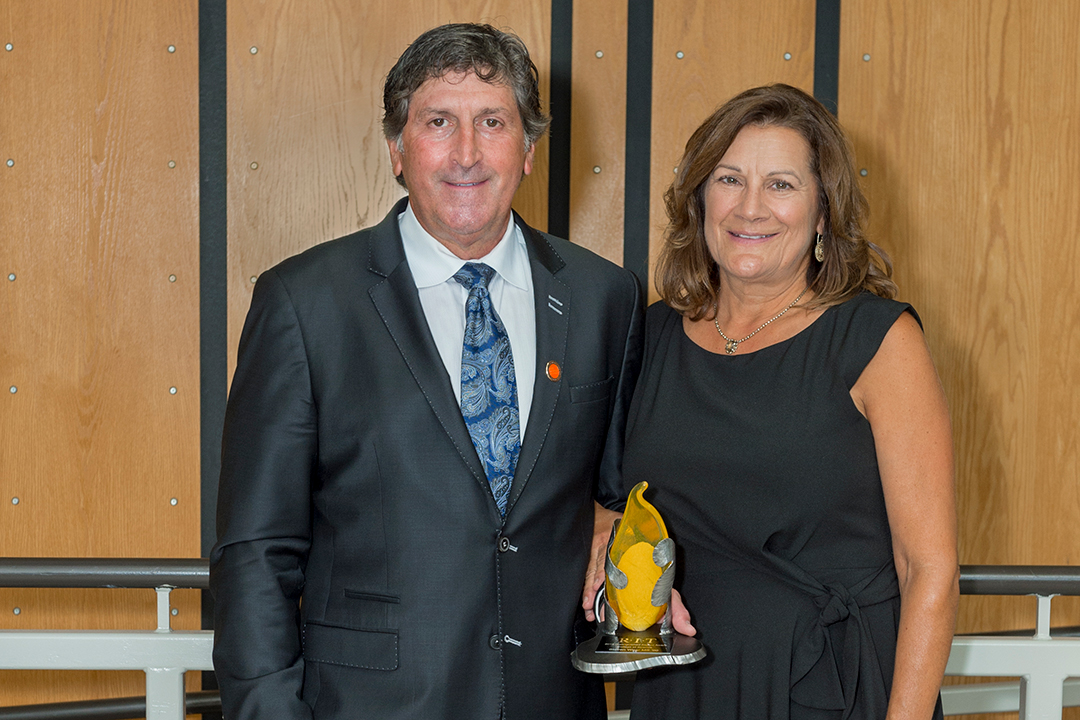Gift from alumnus Steve Wear will support RIT’s imaging science students and drone lab
The Steven M. Wear Unmanned Aircraft Systems Laboratory named in his honor
Elizabeth Lamark
Alumnus Steve Wear donated $500,000 to support the newly renamed Steven M. Wear Unmanned Aerial Systems Laboratory and the Willem “Bill” Brouwer Endowed Fellowship. Wear and his wife Judy are shown here in 2018 when he received the College of Science Distinguished Alumni award.
A gift from a Rochester Institute of Technology distinguished alumnus will help RIT students and researchers reach new heights on the frontier of imaging science. Steve Wear ’91 MS (imaging science) donated $500,000, which will be used to support two causes—the newly renamed Steven M. Wear Unmanned Aircraft Systems Laboratory and the Willem “Bill” Brouwer Endowed Fellowship.
Of the gift, $150,000 will be used as matching funds to incentivize others to propel the Brouwer Endowed Fellowship to its goal of $500,000. Established in 2019 to provide fellowship support for students enrolled in the Ph.D. program in imaging science, this fellowship will be used to pay student stipend, travel, and other direct student expenses related to research for this doctoral program. The fellowship will provide Ph.D. students the ability to pursue research topics independent of those proposed by corporate or government sponsors.
“I believe it’s important to do what we can to memorialize such a remarkable man as Bill Brouwer,” said Wear. “He's considered the founder of the imaging science program, and this was a tall order when most technical people didn't even know what imaging science was. Bill's contributions in the field of optics, not just conceptually but practically, were game changers and his inventions made real-world impacts that are still felt today.”
Susan Houde-Walter, director of the Chester F. Carlson Center for Imaging Science , said the Brouwer Endowed Fellowship is intended for graduate students with the most promise of creative and sophisticated research in imaging science.
“Once fully funded and selected, the future Brouwer Fellow will have license to take risks and explore high-stakes concepts, with the potential of making ground-breaking discoveries and/or inventing truly novel tools.,” she said. “A fellowship of this kind is a researcher’s dream.”
The remaining $350,000 will be used to establish an endowed fund to support student researchers and laboratory personnel to ensure the unmanned aerial systems lab continues to thrive in the future. The lab focuses on designing, engineering, and implementing multimodal imaging systems, calibration techniques, and processing algorithms to provide the highest quality data to solve problems in the fields of precision agriculture, infrastructure inspection, and wildlife management.
“Unmanned aircraft systems are having a major impact all over the world,” said Wear. “One great thing about these systems is that they provide an excellent platform from which a plethora of sensors can be attached. What's important about this lab is its emphasis on a hands-on approach to implementing these systems.”
Wear said while he was a graduate student at RIT as an Air Force officer, he was fortunate to simultaneously have an education-with-industry assignment with Eastman Kodak. The work at Kodak reinforced his studies because he could see the practical application of the theory he was getting at school.
“I believe having a practical application of integrating various sensors, optics, on-board power, and aeronautical propulsion will go a long way in reinforcing these concepts as well in future students,” he said.
Professor Carl Salvaggio, director of the Digital Imaging and Remote Sensing Laboratory, said the funding will provide transformational experiential learning opportunities for imaging science students.
“Each year, we have opportunities for four to eight undergraduate students to work alongside our researchers and gain invaluable experiences in the planning and experiment execution process – we’d love to be able to add more,” said Salvaggio. “The ability to be in the field when the data is being collected, gather the ground reference data, upload the data to the servers, process it from raw to final calibrated form, and then participate in the data analysis is an experience many remote sensing practitioners never have the opportunity to experience in an entire career. These students leave RIT with a skill set that is so beneficial to their future employers and sets them up for an extremely productive and successful careers.”
The gift is part of Transforming RIT: The Campaign for Greatness, the university’s blended campaign seeking support from a variety of investors, including alumni, government and corporate partners, and research foundations and agencies. The campaign recently surpassed its $1 billion goal.









